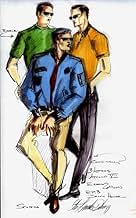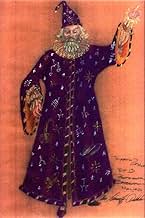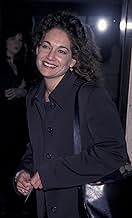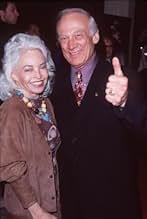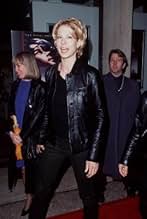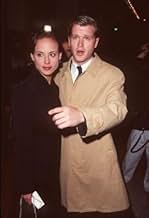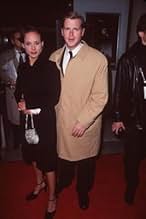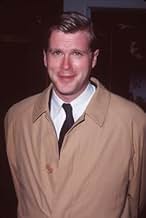Dramatisierte Darstellung des bemannten Raumfahrtprogramms Apollo.Dramatisierte Darstellung des bemannten Raumfahrtprogramms Apollo.Dramatisierte Darstellung des bemannten Raumfahrtprogramms Apollo.
- 3 Primetime Emmys gewonnen
- 22 Gewinne & 33 Nominierungen insgesamt
Zusammenfassung
Empfohlene Bewertungen
This mini-series details the history of the Apollo program from how manned spaceflight got started to the last man on the moon. It very accurately details how we achieved humankind's greatest feat ever: the voyage to, exploration of, and return from, the moon, while adding a very reasonable dramatic twist to it. There are moments where you might laugh, and there are moments where you might feel like crying. There will also be moments where you might feel something else.
Tom Hanks, Ron Howard, Brian Grazer, and the rest of the production staff did an absolutely amazing job in putting this together, everything from the visual effects to the cast and crew. The casting was done so great that this is the first time you cannot pin leading roles in any of the episodes let alone the whole series, even with big names (Hanks, Tony Goldwyn, Mark Harmon, Adam Baldwin, Tim Daly, Cary Elwes, Jay Mohr, Stephen Root, and Lane Smith, not to mention several other big names). Even the writer of the book it's based on, Andrew Chaikin, gets a cameo as the host for "Meet the Press." The soundtrack to this day continues to give me goosebumps highlighting the emotional nature of this series.
Each episode (except episode 12) starts with Hanks as the "host" telling a short anecdote which ties into the episode. The series starts off with featuring the start of the U.S. Manned Space Program versus the Soviet program, highlighting the "firsts" in space by the Soviets and then the Americans, from Mercury to Gemini to the development of Apollo. Episode 2 centers on Apollo 1 fire and the resulting investigation. Episode 3 involves the resumption of the program and highlights the crew before they lift off.
Other Highlightable episodes include the fourth episode, called "1968," which despite how devastating the events of that year were, the Apollo 8 mission helped the year close on a more positive note. The sixth episode highlights the famous Apollo 11 landing on the moon and the first man to step on the moon. Episode 8 is notable for Apollo 13 after its explosion and how the media was trying to find almost anything to feed a hungry audience with tabloid journalism instead of just the facts. Episode 11 is very notable since it focuses on how the wives of Apollo astronauts were affected by their husband's celebrity status and how they coped through the tense, exciting and devastating times. Episode 12, probably one of the most emotional episodes in the series, is about Apollo 17 (the last mission on the moon) and how this mission relates to the a dream from 70 years before by a man called George Melies when he created the moving picture "Le Voyage Dans La Lune." The performances of Hanks (his only appearance as an actor in the series), Daniel Hugh Kelley, Tom Amandes, Tchéky Karyo, Lane Smith, and Stephen Root, with the voice-over of Blythe Danner, make this episode very emotional, especially with everyone except for Karyo in interviews as their older selves.
As much factual information is used while keeping any fictionalized material to a minimum, such as the TV network featuring Emmitt Seaborn (Lane Smith)anchoring the missions for the nation.
This mini-series reminds me what we have worked for in our society and how we are letting that deteriorate now. Back then, it was a man landing on the moon that united the world. It makes you think whether we need something at that caliber to reunite our world today, and how we need to forget our petty differences and better our society as a whole. When you watch this, should think about that, because this is a series you will absolutely never forget.
Coincidently, Apollo 11 landed exactly 35 years ago today. I was 13 years old at the time and living in Nova Scotia, Canada. The 'Eagle' touched down at 5:17 pm, much to the consternation of my mother who was busy trying to prepare supper. Just like Tom Hanks would later relate, I had my models of the Command Service Module, Lunar Module and Saturn V rocket close at hand while I had claimed the living room armchair for the occasion. My family gathered around our old B&W television which was tuned to the Canadian Broadcasting Corporation (CBC), one of only two stations which were available to us back then. Much of the CBC's coverage consisted of a feed from CBS, so we got to watch Walter Cronkite's famous 'Oh Boy!' commentary. My prized 3" reel-to-reel tape recorder (you could get all of 1 hour on a single reel) was busy taping a local radio station carrying NBC's coverage with Jay Barbree.
The entire family congregated again a few hours later for the moonwalk, just before midnight, and watched Neil & Buzz's first steps. I stayed up for the entire 30 hour televised stretch, from lunar landing to liftoff, stealing a moment every now and then to go outside and gaze up in wonder at the moon, filled with awe that two human beings were actually there, living and working on its surface. In this day of CNN and other all-news networks, it should be remembered that the coverage of this event was in itself history in-the-making - TV's longest continuous coverage of a planned event.
My interest in space began with the flight of Apollo 8. When I heard that this was the first manned launch of the world's biggest rocket, the Saturn V, I was sure that one of its million parts would go wrong with disastrous results. Thank God it didn't. I watched and I was forever hooked. A real space junkie, religiously watching each mission after that, coaxing my Mom to let me stay home from school (recurrent cases of 'moon sickness', no doubt), clipping out every newspaper, Life, Time or Newsweek article I could find (now faded yellow with age) and trying to tape as much of the audio coverage as I could (few private individuals could afford a video recorder back then). By Apollo 14, I had earned enough money working at a grocery store to buy a 4-track 7" reel-to-reel recorder (which allowed one to put up to 12 hours on a single tape!) and had built a 15" Heathkit color TV. For Apollo 16, I had added a new-generation 'cassette' recorder to my arsenal (don't forget that the venerable 8-track was still popular at the time). And, of course, I had acquired a VCR by the time the first Space Shuttle flew in 1981. It has always annoyed me that the more recording resources I could afford, the less TV & radio coverage there was available to tape.
But the effect of the Apollo program on me was profound. Because of it, I entered into a career in radio astronomy, enjoying the technical challenge of building instruments to investigate deep space from the Earth, perhaps recognizing the likelihood that I would never have to opportunity to leave its surface (although I did make the first cut for the Canadian Astronaut Program nearly 20 years ago). In tribute to Project Apollo, we named our son (now 16) after astronaut David Scott who commanded Apollo 15, my favorite of all the lunar flights.
In many ways, I feel sorry for the children of today - they will never experience the monumental awe and global celebration that we were privileged to witness back in 1969. Strange, isn't it, that although Apollo - the pinnacle of mankind's technical achievement - which occurred only 35 years ago is now looked on as though it was something out of our deep past rather than a part of our future. It's almost treated like it was a chapter out of ancient history, similar to other great accomplishments like the building of the Pyramids or the Great Wall. Although it might not seem so today, 500 years from now the moon landings will undoubtedly be remembered as the most significant event to have occurred in the 20th century.
It's hard to choose my favorite E2M episode since they were all so good. As an engineer, 'Spider' resonated well with me, portraying the passion and dedication which many of us put into our work, albeit for projects with a much lower profile. 'That's All There Is' brought back fond memories of the Apollo 12 mission. I distinctly remember there was talk at the time that astronauts Conrad and Bean may have been on an accidental oxygen high. It's good to know that there effervescent behavior on the surface was just a manifestation of their normal high spirits and comradely. I was delighted at how 'Galileo Was Right' was able to present the training of the astronauts to be field-geologists in such an entertaining and informative manner. And finally, the bittersweet "Le Voyage Dans La Lune" brought a tear to my eye, just as happened back in 1972 when I watched Apollo 17 and the last lunar module lift-off from the moon. It's even sadder still, that we have not returned, nor will we for perhaps another 20 years.
And don't think if you've seen Apollo 13 that you've seen it all. This series even makes the stories of the guys who built the lunar lander, the geologists who studied the moon rocks, and the wives of the astronauts as appealing and fulfilling as the triumphs and tragedies that are better known.
Tom Hanks' series can only be characterized as the definitive chronical of the space race. Given enough time to properly dissipate the stories, enough talent to portray, and enough insight and intrigue to be accurate, he has put together episode after episode of historically credible and entertaining accounting of this.
Part 1, entitled "Can We Do This?" captures the feeling of overwhelming that America experienced when faced with the daunting task of actually landing on the moon. This episode provides a fitting prologue to the remainder of the series. The second episode, "Apollo 1" is perhaps the first real disection and discussion of the fire that tragically took the lives of astronauts Gus Grissom, Roger Chaffee, and Ed White. (Look for an excellent recounting of the fire itself as told through the narration of Frank Borman...
Perhaps the most well produced episodes are some of the later episodes: Recounting of missions that are easily forgotten in the wake of their more powerful predeccessors. Overall, this series is one of the great treasures of the 1990's, and one of the crown jewels in Tom Hanks illustrious career.
Wusstest du schon
- WissenswertesThe lunar excursion module (LEM) seen in several episodes up close, is in fact a real lunar module. It was originally scheduled to go to the Moon as part of the Apollo 18 flight; NASA budget cuts forced Apollo 18's cancellation, but the LEM was saved and eventually used in filming this miniseries. It is now enshrined in a museum. In some episodes, we can see a bus-like craft which takes the astronauts from NASA down to the pad at Cape Kennedy just prior to launch. This bus is also the real thing, which the real astronauts all used.
- PatzerIn the first episode there is a scene that shows a Navy ship, the ship shown is a Ticonderoga class cruiser, the Navy commissioned the first one, the USS Ticonderoga (CG 47), on Jan. 22, 1983.
- Zitate
Clinton Anderson: [at the senate inquiry following the Apollo 1 fire] Colonel, what caused the fire? I'm not talking about wires and oxygen. It seems that some people think that NASA pressured North American to meet unrealistic and arbitrary deadlines and that in turn North American allowed safety to be compromised.
Frank Borman: I won't deny there's been pressure to meet deadlines, but safety has never been intentionally compromised.
Clinton Anderson: Then what caused the fire?
Frank Borman: A failure of imagination. We've always known there was the possibility of fire in a spacecraft. But the fear was that it would happen in space, when you're 180 miles from terra firma and the nearest fire station. That was the worry. No one ever imagined it could happen on the ground. If anyone had thought of it, the test would've been classified as hazardous. But it wasn't. We just didn't think of it. Now who's fault is that? Well, it's North American's fault. It's NASA's fault. It's the fault of every person who ever worked on Apollo. It's my fault. I didn't think the test was hazardous. No one did. I wish to God we had.
- Alternative VersionenFor the DVD release, the series was cropped slightly at the top and bottom of the frame. This was done to create a presentation that would be enhanced for viewing on widescreen television sets.
- VerbindungenEdited into Race for Space (2010)
Top-Auswahl
- How many seasons does From the Earth to the Moon have?Powered by Alexa
Details
- Laufzeit53 Minuten
- Farbe
- Sound-Mix
- Seitenverhältnis
- 1.78 : 1
Zu dieser Seite beitragen




